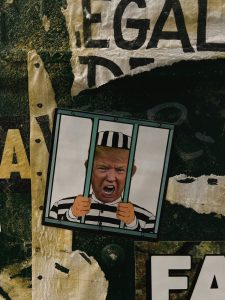by Dan Geddes
1 March 2000
Smoking cigarettes is a cult, a religion, a philosophy. Like most belief-systems, Smoking separates its adherents from non-adherents, leaving the faithful huddled together and zealous. Smokers believe in Smoking despite all logic and reasoning, despite all the arguments of its harm to health, finances, hygiene, stress levels, career, and time. Among the faithful, a certain fatalism sets in: What does it matter? They believe they will somehow escape the ravages of ill health like other faithful believe they will cheat death via life everlasting. Just as many continue to call themselves, say, Catholics, despite an avowed skepticism toward its practices, so Smokers remain Smokers because they’ve been Smokers for years, and they know no other way.
Smoking is all about the illusion of freedom. It’s fun to smoke precisely because you’re not supposed to smoke, and if you had any sense at all you wouldn’t smoke. Just like other religions, belief in the emancipatory powers of Smoking must take place among the young; past the age of 21, most people are not shopping for a new religion. Those who are, are as likely to take up Smoking as anything else.
The illusion of freedom is most powerful among teenagers of junior high or high school age. You find some secret area in the woods, or in the island of freedom that is some smoker’s car, and there you smoke, the lit cigarette in your mouth your badge of freedom and defiance. The first 5 or 10 or 20 taste horrible, or make you ill, but this is like many adult acquired tastes, from pickles to anchovies to alcohol.
Within certain circles, Smoking is as contagious as yawning. Someone lights up a smoke, within two minutes, all are smoking cigarettes, their torches of freedom. To not be smoking when others are, and you yourself are a smoker, is not only to be left out, but also to be a mere inhaler of second-hand smoke, a passive spectator. Perhaps it is, however subtly, a statement of abstinence, and therefore an implicit condemnation. The Smokers may think—Why isn’t he smoking?—just as some meat-eaters are uncomfortable eating with vegetarians. The very abstinence is an implicit critique.
Smokers are all the more tight-knit now, in this age of intolerance and persecution toward smokers. Smokers are an oppressed minority, first segregated into Smoking Sections, than expelled from indoors all together, now even barred from smoking
Smokers are all the more tight-knit now, in this age of intolerance and persecution toward smokers. Smokers are an oppressed minority, first segregated into Smoking Sections, than expelled from indoors all together, or even shunned outside in parks in many cities now.
The Great International Brotherhood of Smokers bonds the world smokers together. It’s a powerful belief-system to have in common, and Smokers often share a great deal of other traits. More than marijuana, Smoking is the true gateway drug, the most basic drug, the foundation of almost all later substance addictions, though many Smokers do not become so advanced, to be sure.
You can always ask a Smoker for a cigarette, and they will usually happily comply if they can (if it’s not their very last one), no matter how poor they are, even if they are homeless. The existence of Other Smokers validates their own belief-system, their own weakness. But if you ask a Smoker for a cigarette, do not explain that you usually don’t smoke, but just gotta have one now because you are drinking or something. Smokers do not want to hear this. You are then a mooch and borrower, and worst of all, an Occasional Smoker.

To be an Occasional Smoker means you are lukewarm in your faith in the Fatalism that all Smokers half-believe: that somehow it doesn’t matter whether they smoke or not, because they might get hit by a truck and die anyway, or, their grandmother smoked until she was 90, or it’s the quality of life, not the quantity of life that counts anyway.
To be an Occasional Smoker is so monstrous to the Smoker, because it shows that the Occasional Smoker has control, will-power. Such will power is an implicit critique of the Smoker, who admits to slavishly smoking one after another without even wanting to: to truly enjoying perhaps one cigarette a week out of a hundred or so. The other cigarettes they light up are minor Declarations of Independence, or little semi-colons to fill up seven minutes of time while waiting for a friend or a bus or a web page or a drink or a dinner or a happy thought. They are rewards for the beleaguered self in need of nurturing: “I worked this stupid job for eight hours, now I’ll do something for me.”
The Great Brotherhood of Smokers suffers its own schisms. Aside from the heretics, the ex-smokers and the Occasional Smokers (so much like those who go to church only on Christmas and Easter), there is the menthol/non-menthol schism. Menthols are so shockingly unlike non-menthols, that Marlboro or Camel smokers cannot fathom this other breed that smokes ground up fiberglass that makes their lungs bleed. Menthol smokers avow the coolness, freshness and crispness of their little friends, as opposed to heavy buffalo taste of the non-menthols.
Much of the iconography of Smoking has now been barred, so it truly has descended to the status of an oppressed religious minority. Philip Morris has been put in position of recanting, of running hip, youth-oriented advertisements stating that Smoking is “Not Cool.” Of course, this is the best advertisement for Smoking of all, precisely why people do it, because it’s not cool!
The new “anti-smoking” commercials are actually the first TV commercials the tobacco industry has been allowed to air since 1969, when cigarette commercials were banned. So the tobacco industry now is allowed to use the most powerful medium in our society to put Smoking before the public, and to say that it is not cool, which for youth again means that the fastest way to Emancipation is to smoke. Think of how crude and square a commercial that stated: “Smoking is Cool” would be in our post-ironic age. In our society, that might do more to reduce the number of smokers than to say that “Smoking is not Cool.”
Smoking is clearly a forbidden fruit, and as such it has lost little popularity among the young. Despite the attack of federal and state government upon the tobacco industry, its power and wealth continues unabated. The industry has even avoided the inconvenience of being regulated by the FDA, which would force the tobacco industry to go to the trouble of infiltrating the FDA, like the food and dairy industry has been forced to do: to put their own researchers and executives in the FDA long enough to get key products approved, and then returning the selfsame individuals back to cushy positions back in the industry.
The Smoker’s Creed—that he may die any day anyway, so what difference does it make?—makes some sense in an age where so-called fresh air and water and vegetables are contaminated. But longevity, for those who are “fated” to die of an accident, is clearly a game of percentages, and in the end Smoking does more to give the advantage to the House, that is, Death, then any other single factor.
Thoreau’s now famous statement that “Most men lead lives of quite desperation,” gains credence when you stand in line at any convenience store and see just how many people purchase only two items: cigarettes and lottery tickets. They gotta have faith.






Be First to Comment